For the 2025 school year, there are 2 public elementary schools serving 357 students in Newton Falls Exempted Village School District. This district's average elementary testing ranking is 4/10, which is in the bottom 50% of public elementary schools in Ohio.
Public Elementary Schools in Newton Falls Exempted Village School District have an average math proficiency score of 48% (versus the Ohio public elementary school average of 54%), and reading proficiency score of 54% (versus the 59% statewide average).
Minority enrollment is 9% of the student body (majority Hispanic), which is less than the Ohio public elementary school average of 35% (majority Black).
Overview
This School District
This State (OH)
# Schools
3 Schools
2,458 Schools
# Students
616 Students
1,091,015 Students
# Teachers
37 Teachers
63,050 Teachers
Student : Teacher Ratio
17:1
17:1
District Rank
Newton Falls Exempted Village School District, which is ranked within the bottom 50% of all 918 school districts in Ohio (based off of combined math and reading proficiency testing data) for the 2021-2022 school year.
The school district's graduation rate of 85-89% has stayed relatively flat over five school years.
Overall District Rank
#501 out of 929 school districts
(Bottom 50%)
(Bottom 50%)
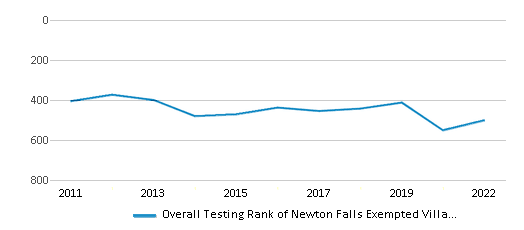
Math Test Scores (% Proficient)
48%
52%
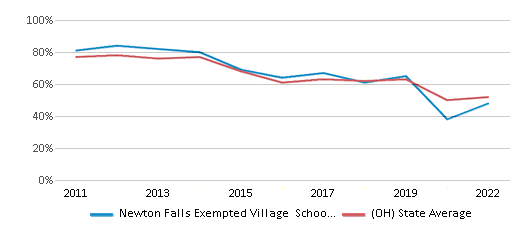
Reading/Language Arts Test Scores (% Proficient)
54%
60%
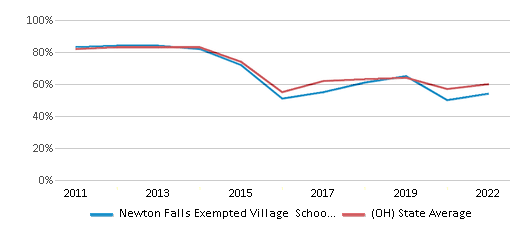
Science Test Scores (% Proficient)
63%
63%
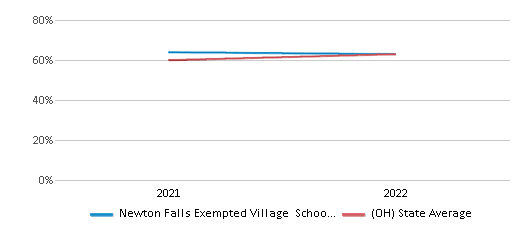
Graduation Rate
85-89%
86%
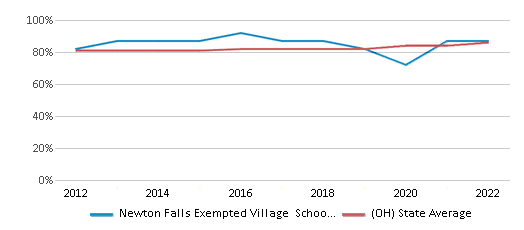
Students by Ethnicity:
Diversity Score
0.15
0.55
# American Indian Students
n/a
1,574 Students
% American Indian Students
n/a
n/a
# Asian Students
n/a
32,328 Students
% Asian Students
n/a
3%
# Hispanic Students
9 Students
86,617 Students
% Hispanic Students
1%
8%
# Black Students
6 Students
192,244 Students
% Black Students
1%
18%
# White Students
567 Students
704,631 Students
% White Students
92%
64%
# Hawaiian Students
n/a
1,092 Students
% Hawaiian Students
n/a
n/a
# Two or more races Students
34 Students
72,529 Students
% of Two or more races Students
6%
7%
Students by Grade:
# Students in PK Grade:
-
30,887
# Students in K Grade:
-
112,601
# Students in 1st Grade:
-
119,240
# Students in 2nd Grade:
-
123,668
# Students in 3rd Grade:
-
116,979
# Students in 4th Grade:
66
120,578
# Students in 5th Grade:
67
121,564
# Students in 6th Grade:
66
121,429
# Students in 7th Grade:
73
90,010
# Students in 8th Grade:
85
88,363
# Students in 9th Grade:
79
11,363
# Students in 10th Grade:
61
10,664
# Students in 11th Grade:
54
12,317
# Students in 12th Grade:
65
11,352
# Ungraded Students:
-
-
District Revenue and Spending
The revenue/student of $23,630 is higher than the state median of $17,287. The school district revenue/student has grown by 46% over four school years.
The school district's spending/student of $20,166 is higher than the state median of $17,235. The school district spending/student has grown by 46% over four school years.
Total Revenue
$15 MM
$28,879 MM
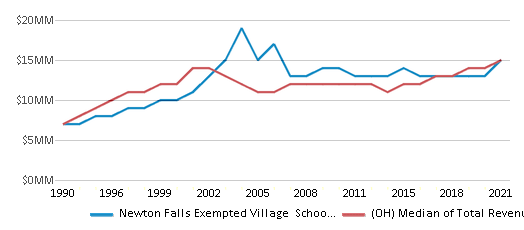
Spending
$12 MM
$28,792 MM
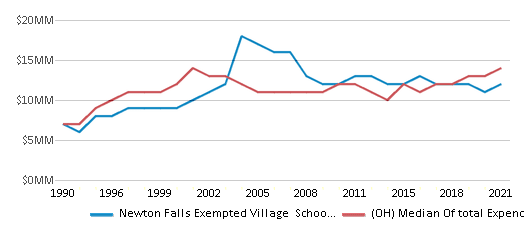
Revenue / Student
$23,630
$17,287
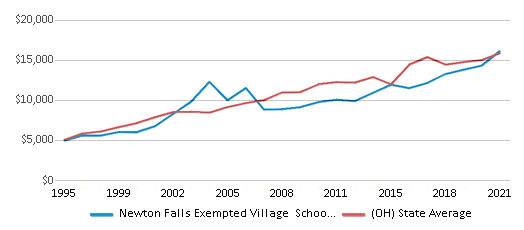
Spending / Student
$20,166
$17,235
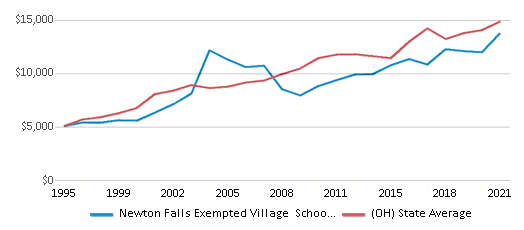
Best Newton Falls Exempted Village School District Public Elementary Schools (2025)
School
(Math and Reading Proficiency)
(Math and Reading Proficiency)
Location
Grades
Students
Rank: #11.
Newton Falls Middle School
(Math: 60-64% | Reading: 65-69%)
Rank:
Rank:
7/
Top 50%10
905 Milton Blvd
Newton Falls, OH 44444
(330) 872-0695
Newton Falls, OH 44444
(330) 872-0695
Grades: 4-5
| 133 students
Rank: #22.
Newton Falls Junior High School
(Math: 40% | Reading: 47%)
Rank:
Rank:
4/
Bottom 50%10
907 1/2 Milton Blvd
Newton Falls, OH 44444
(330) 872-5445
Newton Falls, OH 44444
(330) 872-5445
Grades: 6-8
| 224 students
Recent Articles

Year-Round Or Traditional Schedule?
Which is more appropriate for your child? A year-round attendance schedule or traditional schedule? We look at the pros and cons.

Why You Should Encourage Your Child to Join a Sports Team
Participating in team sports has a great many benefits for children, there is no doubt. In this article you will learn what those benefits are.

White Students are Now the Minority in U.S. Public Schools
Increasing birth rates among immigrant families from Asia and Central and South America, combined with lower birth rates among white families, means that for the first time in history, public school students in the United States are majority-minority. This shift in demographics poses difficulties for schools as they work to accommodate children of varying language abilities and socio-economic backgrounds.





